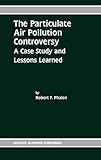The particulate air pollution controversy: a case study and lessons learned [Libro electrónico] / by Robert F. Phalen
Por: Phalen, Robert F [autor/a].
Tipo de material: Libro
en línea Editor: Boston: Kluwer Academic Publishers, c2002Descripción: xiii, 128 páginas : ilustraciones ; 25 centímetros.ISBN: 1402072252; 9781402072253; 9780306482083.Tema(s): Particles -- Environmental aspects | Particles -- Health aspects | Air -- PollutionNota de acceso: Disponible para usuarios de ECOSUR con su clave de acceso Nota de bibliografía: Incluye bibliografía e índice: páginas 125-128 Número de sistema: 54914Contenidos:Mostrar
Resumen:
Libro
en línea Editor: Boston: Kluwer Academic Publishers, c2002Descripción: xiii, 128 páginas : ilustraciones ; 25 centímetros.ISBN: 1402072252; 9781402072253; 9780306482083.Tema(s): Particles -- Environmental aspects | Particles -- Health aspects | Air -- PollutionNota de acceso: Disponible para usuarios de ECOSUR con su clave de acceso Nota de bibliografía: Incluye bibliografía e índice: páginas 125-128 Número de sistema: 54914Contenidos:Mostrar
Resumen:| Tipo de ítem | Biblioteca actual | Colección | Signatura | Estado | Fecha de vencimiento | Código de barras |
|---|---|---|---|---|---|---|
| Libros | Biblioteca Electrónica Recursos en línea (RE) | Acervo General | Recurso digital | ECO400549146007 |
Incluye bibliografía e índice: páginas 125-128
Preface.. 1. Harmful effects of particulate air pollution.. 2. Historical overview.. 3. Interpreting the PM epidemiology.. 4. The nature of urban particulate matter.. 5. The fates of inhaled particles.. 6. The toxicology of particulate material.. 7. Research needs.. 8. What's at stake?.. 9. Challenges to dogma.. 10. Conclusions and recommendations.. Index
Disponible para usuarios de ECOSUR con su clave de acceso
Small invisible particles in the urban air, especially those produced by human activities, have recently stimulated intense scrutiny, debate, regulation, and legal proceedings. The stakes are high, both with respect to health impacts and economic costs, and the methods used previously to resolve similar issues are no longer adequate. Everyone on earth inhales thousands to millions of particles in each breath, so if urban particulate air pollution-particulate matter (PM)-is significantly hazardous, the negative impact on health could be staggering. Yet the activities that generate PM, such as farming, manufacturing, mining, transportation, and generating electricity, are themselves essential to human health and welfare. Scientists, regulators, legislators, activists, judges, lawyers, journalists, and representatives of the business community are actively involved in addressing the question of what should be done. This complex issue presents opportunities for critically assessing the relevant knowledge and for adopting more rigorous approaches to this and similar problems. What is the PM controversy, and why is it a good case study for how science and public policy might better interface? The PM controversy is the sum of the frequently heated debates related to the potential health risks from urban PM. eng
Disponible en línea
Disponible en formato PDF
Subscripción a ELSEVIER 26 de diciembre del 2013
